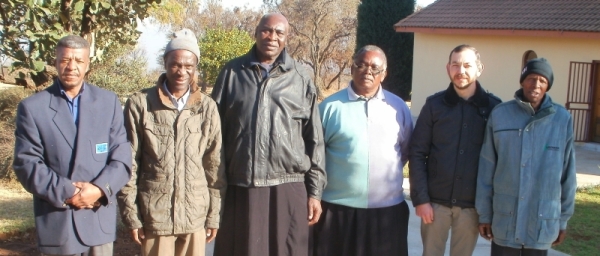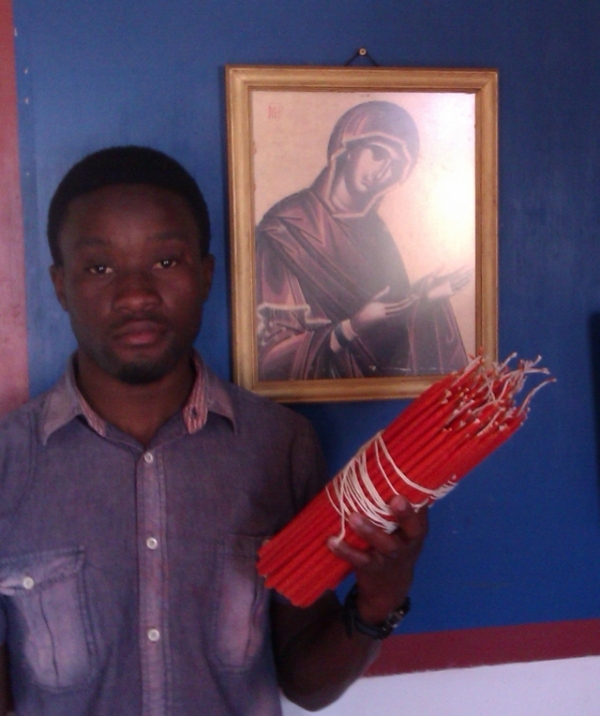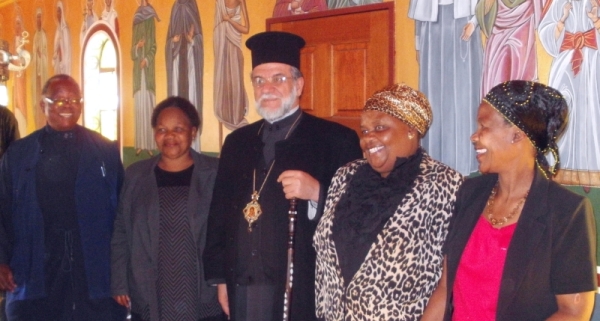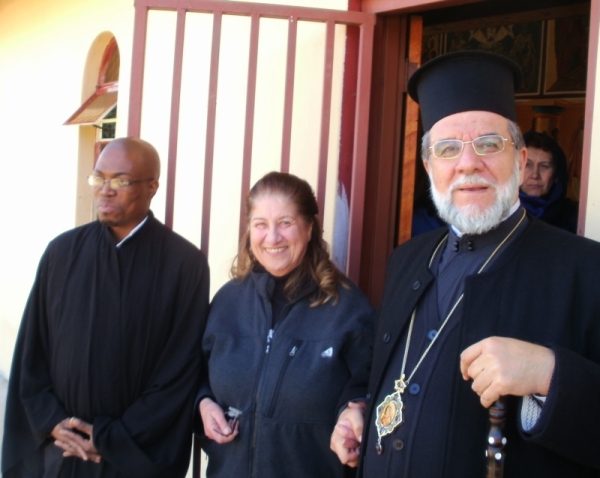At the weekend we had a church leaders’ training course, followed by a Women’s Day gathering and picnic.
In South Africa August 9 is Women’s Day, in memory of the thousands
of women who marched to the main government office in Pretoria to
protest against passes (internal passports) for women, which the
government at that time wanted to introduce. It also falls in the Dormition Fast, so it seemed a good day to celebrate the most notable Christian woman of all, Mary, the Mother of God.
The leaders training was for those who are, or might be called to be,
church readers, and was for males only, as it was held on the premises
of the Monastery of the Descent of the Holy Spirit at Gerhardsville,
south wast of Pretoria.

Students
on the leaders training course: Bheki Buthelezi of Olievenhoutbos;
Artemius Mangena of Atteridgeville; Nicholas Chauke of Soshanguve; Fr
Frumentius Taubata; Christo Kokkinos of Vanderbijlpark; and Ernest
Shilubane of Soshanguve.
Fr Elias Palmos bought beds to provide sleeping accommodation in the
monastery library. We thought we might be roughing it a bit, but the
beds were actually very comfortable.
When I arrived on Friday afternoon only Christo Kokkinos was there,
and Fr Frumentius Taubata and his assistant Victor Rhema, who live on
the premises, and prepared meals for us. As it was the Dormition Fast,
the meals were very simple. We went to St Demetrius Church for the 9th
Hour, and then had supper, and were joined by Bheki Buthelezi, who lives
nearby at Olievenhoutbos.We waited for people from Soshanguve to join
us, but they got lost in the dark, because of the road works on the
R511, and eventually Fr Frumentius went out to meet them.
We had introductions and learnt a bit about each other. Christo
Kokkinos runs a bicycle shop in Vanderbijlpark, and had helped out as a
reader in his parish. Bheki Buthelezi hails from KwaZulu-Natal, but is
working in Gauteng for SANRAL, the national roads agency, and is staying
at Olievenhoutbos. He is preparing for baptism. Ernest Shilubane and
Nicholas Chauke are from Soshanguve, and are leaders in St Seraphim
parish there. We finished off with Compline in the church quite late at
night.
On Saturday morning we started at 6:00 am with the First Hour; it was
dark when we went into the church, and as we came out it was just
beginning to get light in the east. There is no electricity in the
church, so we used candles, which are made on the premises by Victor
Rhema. If any parishes are interested in buying church candles, you can
get them from the monastery — each bundle Victor is holding in the
picture costs R50.00.
After the First Hour there was time for washing, tidying rooms, and
reading until breakfast at 8:00 am. I went Atteridgeville to fetch
Artemius Mangena, who was not able to join us on Friday evening because
he still had to go for medical treatment from the time he was staying at
the monastery and was shot by armed robbers some months ago.
This was followed by the Third Hour at 9:00 am. To begin with I read
the Hours, but gradually some of the others joined in, and we used
English, North Sotho and Zulu. After the Third Hour I said something
about the daily cycle of prayer in the church.
Vespers – at sunset
Compline (Apodipno) after supper
Nocturns (Mesonichto) – midnight
Matins (Orthros) – 3 am
First Hour — 6 am
Third Hour — 9 am
Sixth Hour — Midday
Ninth Hour — 3 pm
In parish practice the services are usually “aggregated”, that is,
jolined together into one longer unit. So the Vigil usually consists of
the Ninth Hour, followed by Vespers, Matins and the First Hour, and in
some parishes Matins immediately precedes the Divine Liturgy. During the
course, however, we had them separately, partly to show their
connection with the time of day, and partly to interperse the teaching
sessions with prayer. We did not have Matins and Vespers, as they are
much more complicated, and need a choir that can look up and sing all
the variable bits. stichera etc, which we did not have. We were beginning with the relatively simple stuff, like the Hours and Small Compline.
We had tea and some more teaching, and then the Sixth Hour at noon, followed by lunch.
On Saturday afternoon Fr Elias Palmos arrived, bringing some course
handbooks, and taught on the Ecumenical Councils especially the first
one, and the doctrinal issues they dealt with, and in another session he
taught on the Holy Trinity. Ernest Shilubane had to leave in the
afternoon for a funeral, and in the evening I had to take Artemius
Mangena back to Atteridgeville, as he had not brought any blankets with
him.
On Sunday morning we had the First Hour at 6:00 am again, and Val
came to join us for the Divine Liturgy, which we sang following the
Third Hour. In many parishes the Liturgy of Preparation is done
concurrently with another service, like Matins or the Hours, so that
there is one service going on at the altar and another in the nave of
the church, but we did the preparation separately, so that the students
could see how the bread and wine are prepared for the Divine Liturgy.
At the Divine Liturgy itself, Fr Frumentius served as priest and I
served as deacon, while Val was the choir. Victor Rhema and Bheki
Buthelezi, who are not yet baptised, stayed in the nave of the church.
Some people from Atteridgeville, 21 km away, were supposed to join us,
but could not do so as the taxis that were meant to bring them were
engaged in ferrying people to Limpopo for Women’s Day.
Before, during and after lunch we had an informal class on church history, sitting round the table in the trapeza,
where the students asked questions. We covered early church history of
the Patriarchate of Alexandruia, to explain the origins of the Coptic
and Ethiopian Churches, and how we differed from them. This was also a
follow-up and expansion of what Fr Elias had taught the previous day
about the Ecumenical Councils and the nature and person of Christ.
In the afternoon, after the 9th Hour we went through the Liturgy of Preparation (Proskomedia) that we had done that morning, line by line, action by action, explaining the theological meaning of each part of the service.
We ended that day, as usual, with Compline, though somewhat earlier
than on previous days, as we were all tired, and went to bed early.
On Monday we started with the First Hour before dawn again, only this
time there were only two of us, as Nicholas Chauke had gone back to
Soshanguve to fetch the women for the Women’s Day gathering. Fr Kobus
arrived to give some teaching on preparation for Holy Communion, but we
suggested he should wait until more people had arrived, and instead we
did the Readers Service (Obednitsa), mainly to show Christos how it could be done.
When Nicholas Chauke returned with the Soshanguve people, Fr Kobus
gave his teaching to a larger audience, and by then others were arriving
for the Womens Day gathering as well. There were people from several
different parishes, and His Eminence Metropolitan Damaskinos. Archbishop
of Johannesburg and Pretoria. There was also the local city councillor.

Fr Elias leading the Akathist hymn. In the foreground, in isishweshwe skirts, are Angela and Martha Krunic.
Fr Kobus served a Paraklesis to the Theotokos, and then
Archbishop Damaskinos spoke briefly, and Thomae Cavaleros spoke about
the life of the Theotokos and its significance for Christians today. Fr
Elias Palmos also spoke on the life of the Theotokos, and this was
followed by an Akathist Hymn, and then a picnic.
Owing to a misunderstanding some people had not brought any food, but
others had brought more than enough, and so there was enough to go
round, with some left over. Owing to another misunderstanding, Simon
Shabangu, who was one of those involved in the planning of the course,
missed the first couple of days, but managed to make it on the last day,
and his comment was, “what a beautiful day
it was indeed. We should continue organising such progressive events
every now and then, since they unite the people in terms of getting to
know each other n share ideas.”
We hope to be able to hold more leaders training courses in the
coming months, at least 3-4 times a year, and hope we don’t have to wait
12 years for the next one!
See






Δεν υπάρχουν σχόλια:
Δημοσίευση σχολίου